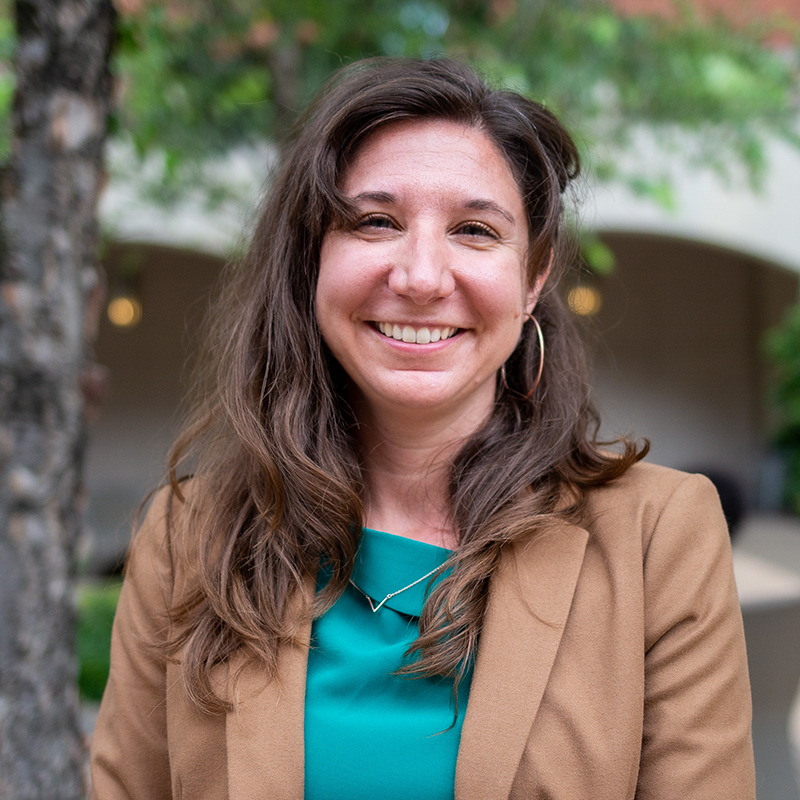Resilience, Resistance and Transformation: Psychology Professor Britney Brinkman Publishes Book Based on Research About Girls' Experiences in School Tuesday, May 17, 2022

"Our main motivation for this book is to uplift the experiences of girls, to center their own narratives and experiences. Our goal is to bring light to ways in which girls are navigating challenges within their school systems and the complexities of that. We want to highlight their stories and experiences that often get swept aside or minimized."
Following 15 years of research on young girls' experiences in schools, Britney Brinkman, Ph.D., associate professor of psychology at Point Park University, has published "Girls’ Identities and Experiences of Oppression in Schools: Resilience, Resistance, and Transformation," a book that explores "the ways in which girls and adults in school systems hold multiple realities, negotiate tensions, cultivate hope and resilience, resist oppression and envision transformation." Brinkman wrote it with her mother, Kandie Brinkman, who is a sociologist, and her friend, Deanna Hamilton, a psychologist.
"Our main motivation for this book is to uplift the experiences of girls, to center their own narratives and experiences," she said. "Our goal is to bring light to ways in which girls are navigating challenges within their school systems and the complexities of that. We want to highlight their stories and experiences that often get swept aside or minimized."
In the Q&A below, learn more about Brinkman, the book and how she connects her research to the classroom.
What led to this publication?
We've been interested in girls' experiences in schools. We were asked to go into a Catholic school to offer a training or intervention program to support 6th grade girls in 2004. We facilitated an empowerment program for girls to teach them about a variety of experiences they may encounter, such as sexism, to help them name those experiences and help them think about how to navigate them in and outside of school, knowing that they were already doing some of that. We wanted to capture the ways girls were already resilient and offer them additional tools to give them the best opportunity to thrive in their environment. We did an intervention study through their junior year and collected data. We also went back to the district a few years later to gather more information. The book includes quotes from interviews with the girls, as well as educators who were involved.
Describe a moment that reaffirmed your commitment to this work.
In the first year of the program, one of the activities we did was distribute journals to the girls so that they could write about their experiences in and outside of school. The girls told us some of the boys in their class were stealing their journals. One boy saw his name was written in a journal and saw that the journal entry mentioned sexism, but he thought it said "sexy." The boy ripped up the journal. Even as these girls were trying to make sense of their experiences, some of their classmates were having an issue with that. We actually did a meeting with the boys in the class to talk about how they thought it was unfair that this program existed for the girls, and we offered to create a similar program for boys, but none of them participated.
Another moment that sticks out in my mind was when we did follow-up visits in 2017. We asked the girls tell us about an experience they had where they felt they were treated differently as a girl. Almost every girl immediately launched into telling us about the school’s dress code. They had a uniform, but the school mandated that girls had to wear tights under their skorts year-round. The girls were called into an assembly during which they were told they were distracting the boys and male teachers. This gave us insight into how hypersexualization and victim-blaming happen in a school setting. It wasn't just in the policy. It was in the messaging and the implementation, that somehow it’s the girls' responsibility to keep boys from being distracted by their bodies.
Which audiences do you hope to reach with this book?
It is based in research, but we really wrote it for a broad audience. It offers valuable pedagogies, policies and practices for educators, counselors, social workers and policy makers, as well as academics and students in social, developmental and educational psychology. It’s also an important read for high school students and anyone who works with teens, whether in schools or as parents. Everyone should be invested in what’s happening in our schools.
How does this project relate to what you teach in class at Point Park?
In teaching clinical psychology students, my work helps me to explain to them what kinds of experiences girls are going through today, so if they're working with a teenager in one-on-one therapy, they know what kinds of experiences to expect or identify. I also see clients myself, and I have a handful of teenage clients. I try to bring that information into my classroom to get my students thinking about those kinds of dynamics.
The Department of Psychology emphasizes community-based psychology, so I talk to my students a lot about this idea of transforming systems to improve our communities. We need to do that one-on-one work to support girls who are being oppressed, but also we should be changing the systems that lead to those experiences. I am working on some policies with a local school district because the same kind of language that happened at the school we studied is coming up locally. I’m talking to students in the psychology program about how to do that, how to promote different policies in a school system. We have unique access to the research to help students understand what may be affecting schools.

